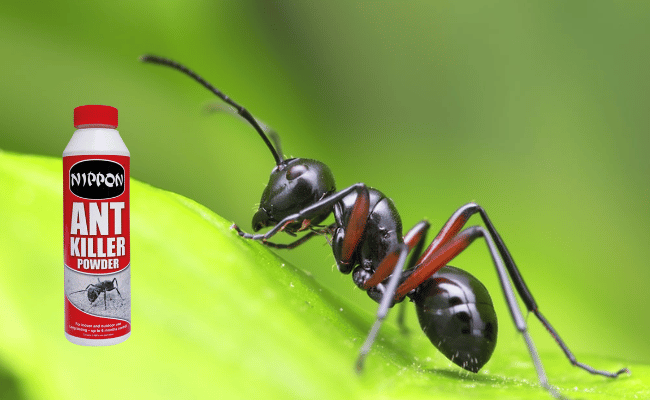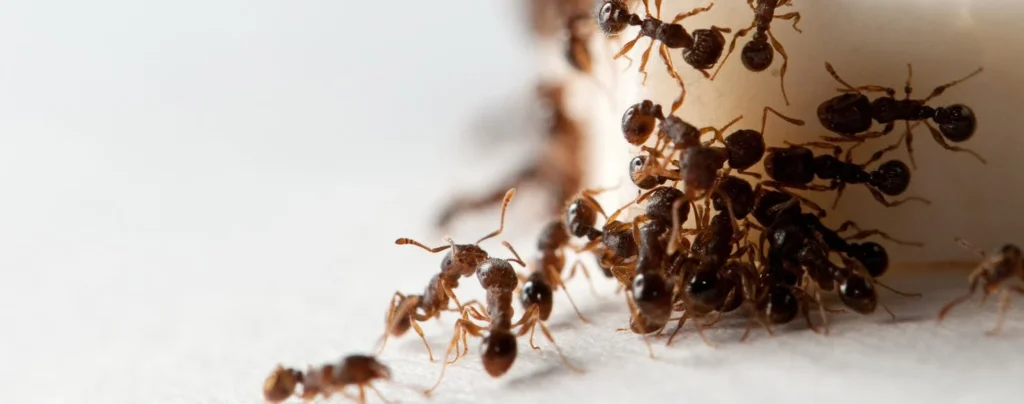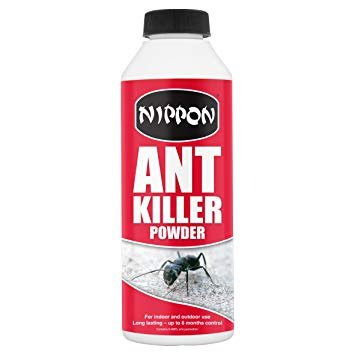Ant powder kills ants and bugs but can be bad for people if not used carefully. It has things that can make your skin, breathing, and tummy hurt if you touch it or breathe it in. Some powders have stuff called boric acid which is okay in small amounts but can be bad if you eat a lot.
It’s important to use it right by following the label, wearing protection, and keeping it away from kids and pets. Breathing it in or eating it can make you sick with coughing, tummy ache, or feeling bad. It’s also bad for the earth if not used correctly.
What Ingredients in Ant Powder Harm Humans?

Ant powders contain various active ingredients designed to eliminate ants and other insects. Three commonly used substances are pyrethroids, boric acid, and diatomaceous earth.
Pyrethroids
These are synthetic chemical compounds derived from natural extracts of chrysanthemum flowers. They work by disrupting the nervous systems of insects upon contact, leading to paralysis and eventually death. Common pyrethroids used in ant powders include permethrin, cypermethrin, and deltamethrin.
Boric Acid
Considered a low-toxicity pesticide, boric acid affects insects’ digestive systems. When ants consume it, boric acid damages their digestive tract and leads to dehydration, ultimately causing their death. While generally safe for humans in small doses, ingesting large amounts can be harmful.
Diatomaceous Earth
This substance is made from the fossilized remains of tiny aquatic organisms called diatoms. It works by physically damaging the exoskeletons of insects, leading to dehydration and death. Diatomaceous earth is considered less toxic to mammals but can cause respiratory irritation if inhaled in significant quantities.
Explanation of how these ingredients work against insects
Each active ingredient in ant powder has a specific mode of action against insects.
Pyrethroids
These chemicals affect the nervous system of insects, disrupting normal function and leading to paralysis and death. They often act quickly upon contact or ingestion by the insects.
Boric Acid
When ingested by ants, boric acid interferes with their metabolism and digestive processes, causing internal damage and eventual death. It acts more slowly compared to contact insecticides.
Diatomaceous Earth
This substance has abrasive properties that physically damage the protective outer shells of insects. This leads to the loss of moisture from their bodies, causing dehydration and death. It is effective but may take longer to eliminate a colony.
The potential harm to humans from these ingredients
While these ingredients are designed to target insects, they can potentially harm humans if misused or if there’s direct exposure:
Pyrethroids
Direct contact or inhalation of pyrethroids can cause skin irritation, respiratory issues, or allergic reactions in some individuals.
Boric Acid
Ingestion of large amounts of boric acid can lead to gastrointestinal issues and, in severe cases, poisoning. However, in regulated amounts, it’s generally considered low in toxicity to humans.
Diatomaceous Earth
While less harmful to humans, inhaling significant amounts of diatomaceous earth dust can cause respiratory irritation.
How Does Ant Powder Affect Human Health?
These potential health risks associated with direct contact, inhalation, and ingestion of ant powder is crucial for proper handling and ensuring safety measures are in place during its use.
Direct contact with ant powder and its effects on the skin
Ant powder, when in direct contact with the skin, can cause irritation, redness, itching, or allergic reactions in sensitive individuals.
The active ingredients in ant powder, such as pyrethroids or boric acid, may prompt skin irritation or allergic dermatitis upon prolonged exposure or in higher concentrations.
Sensitivity can vary among individuals, with some people experiencing stronger reactions than others.
Respiratory risks associated with inhaling ant powder
Inhaling ant powder, particularly the fine particles or dust, can lead to respiratory issues such as coughing, throat irritation, difficulty breathing, or exacerbation of existing respiratory conditions.
Some active ingredients, like diatomaceous earth, may irritate the respiratory tract if inhaled in significant amounts.
Individuals with asthma, allergies, or other respiratory conditions may be more susceptible to adverse effects from inhaling ant powder.
Potential harm from accidental ingestion of ant powder
Accidental ingestion of ant powder can result in various levels of toxicity, depending on the quantity ingested and the specific active ingredients present.
Symptoms of ant powder ingestion can include nausea, vomiting, abdominal pain, diarrhea, and, in severe cases, poisoning.
Boric acid, found in some ant powders, can be toxic in larger amounts if ingested, potentially affecting the digestive system and leading to more severe symptoms.
Varied toxicity levels of different ingredients in ant powder
Different active ingredients in ant powder have varying levels of toxicity to humans.
Pyrethroids, while effective against insects, can cause skin irritation or allergic reactions in some individuals but are generally considered of low toxicity to humans in small doses.
Boric acid, though relatively low in toxicity in small amounts, can be harmful if ingested in large quantities.
Diatomaceous earth is considered less toxic to mammals but can cause respiratory irritation if inhaled in significant quantities.
What Safety Measures Should You Take with Ant Powder?

Adhering to these safety measures is crucial to mitigate potential risks associated with the use of ant powder.
Importance of following instructions on the product label
The product label contains crucial information regarding the safe and effective use of ant powder.
It provides instructions on proper dosage, application methods, safety precautions, and disposal guidelines.
Following these instructions is vital to ensure the efficient control of pests while minimizing potential risks to human health and the environment.
Necessary precautions while handling ant powder
When handling ant powder, it’s important to wear protective gear such as gloves, masks, and goggles to prevent direct contact with the skin, eyes, or respiratory system.
Avoid touching the face or other parts of the body while handling the powder and wash hands thoroughly after use.
Store the product in a secure place away from food, children, and pets to prevent accidental exposure.
Safeguarding measures to protect children and pets
Keep ant powder out of reach and sight of children and pets by using childproof containers or placing it in areas inaccessible to them.
Consider using ant traps or bait stations instead of loose powders in areas where children or pets may have access.
Educate household members about the potential dangers of ant powder and the importance of avoiding contact.
Use of protective gear during application
When applying ant powder, wear appropriate protective gear, including gloves and a mask, to minimize skin contact and inhalation of powder dust.
Ensure proper ventilation in the application area to reduce the concentration of airborne particles.
Apply the powder precisely as directed on the label, targeting specific areas where ants are present, and avoid excessive or unnecessary application.
FAQ’s
What is the most harmful pesticide for humans?
The degree of harm varies, but organophosphates and organochlorines are considered highly toxic to humans due to their potential effects on the nervous system and long-term health risks.
How long does ant powder last?
The effectiveness of ant powder depends on various factors such as environmental conditions and application. Typically, it can remain active for weeks to months if undisturbed.
How long do pesticides stay in your body?
The duration pesticides stay in the body varies depending on the specific pesticide, exposure level, metabolism, and other factors. Some may be eliminated relatively quickly, while others may persist for days or even months in trace amounts.
Is cockroach powder harmful to humans?
Cockroach powder usually contains insecticides that can be harmful to humans if not used as directed. Direct contact or inhalation of the powder may cause skin irritation, respiratory issues, or other health problems.
What happens if insecticide touches your skin?
Contact with insecticide on the skin can lead to irritation, redness, itching, or allergic reactions. Some insecticides may cause more severe effects if exposure is prolonged or in higher concentrations.
How toxic is Raid to humans?
Raid and similar household insecticides can be harmful if not used according to the instructions. The active ingredients, typically pyrethroids, can cause skin irritation, respiratory problems, or other health issues upon direct contact or inhalation.
Final Words
Using ant powder to get rid of ants can be helpful, but it can also be harmful if not used carefully. Always read the label and follow the instructions to use it safely. Remember to wear protective gear like gloves and masks when handling it, and keep it away from kids and pets.
If you accidentally touch it or feel unwell, seek help and tell the doctor what you used. It’s also a good idea to consider other ways to control ants that might be safer for everyone. Staying safe while using ant powder is important to keep pests away without causing harm to yourself or others.

